With 1408, Stephen King, the Man Behind Film's Most Famous Haunted Hotel Gives Us the World's Scariest Hotel Room
That is one evil fucking room!
In The Fractured Mirror, my upcoming book about American movies about the film industry, I write about several weird little niches/sub-sub-genres. One of them is Location Horror, a surprisingly voluminous series of fright flicks about films made on sets that seem spooky because they are genuinely haunted.
This overlaps with another sub-genre about tortured screenwriters who lock themselves in a seemingly haunted abode in a misguided attempt at verisimilitude.
For example, I write about 2007’s Final Draft, a morbid and muddled bit of macabre in which James Van Der Beek plays a tormented screenwriter who locks himself in a creepy apartment to finish a screenplay about an insane clown.
I described it as an actor’s showcase that unfortunately showcases Van Der Beek’s weaknesses as an actor.
I’m not going to lie: that line amused the hell out of me. Then I saw Van Der Beek selling memorabilia to help pay for his cancer treatment.
It’s sad and telling that even a famous television and movie star has to hustle to afford possibly life-saving medical treatment.
It’s a tragedy, is what it is. I can’t believe I must cut that line to avoid coming off as a callous monster. It’s an amusing line, but it isn’t funny enough to justify its cruelty.
While watching the 2007 big-screen adaptation of Stephen King's short story, “1408”, I thought of Final Draft and poor James Van Der Beek.
1408 functions as the rich man’s version of Final Draft. Instead of a screenwriter losing it in self-imposed isolation, the protagonist is author Mike Enslin (John Cusack). He’s a bitter antihero whose novel didn’t sell much, so he moved onto a sleazier, less creatively fulfilling but more lucrative gig traveling to famously haunted locations to debunk supernatural lore.
Mike is a cynic and a skeptic who is convinced that ghosts, goblins, and beasties do not exist except in the minds and imaginations of the suggestible and gullible.
As part of his ongoing project to deny the supernatural, Mike checks into The Dolphin, a fictional New York hotel similar to The Cecil. It’s notorious for room 1408, which it refuses to let people stay in following a series of mysterious and troubling deaths.
The Shining is about a haunted hotel. 1408 limits its action to a hotel room so haunted that even a cynic like Mike has to concede that it has seriously bad mojo. Fifty-six people have perished in the hotel room of doom.
The Dolphin’s elegant manager Gerald Olin (Samuel L. Jackson) does everything in his power to dissaude Mike from staying in a room he’s sure will kill him swiftly, but he’s ultimately forced to let him stay in room 1408 for exceedingly sketchy legal reasons.
Cusack and Jackson both receive star billing, but Jackson’s role is exceedingly brief. He’s probably in the movie for less than ten minutes, but that’s all it takes to leave an indelible impression.
Jackson’s elegant performance as an impeccably put-together gentleman helps ground a story that doesn’t hold up to a bit of scrutiny and gets sillier and more preposterous the more you think about it.
Gerald does everything in his power to save Mike from the horrors of what he refers, not inaccurately, as an “evil fucking room.”
Mike is at first shocked by the room’s banality. It’s anything but a gothic chamber of horrors. Room 1408 at first appears to be nothing more than a typical hotel room, complete with an eyesore of a paint job and a tacky maritime painting on the wall.
That changes quickly. The hotel room where most of the movie begins goes haywire almost immediately. A clock radio plays The Carpenters’ “We’ve Only Just Begun”, seemingly of its own accord.
“We’ve Only Just Begun” is the film’s primary musical motif. It’s a smart choice because it’s banal in a milquetoast, soft rock, AM morning radio way but also achingly, agonizingly sad.
The ballad, which began as a bank commercial jingle, attains an additional melancholy power from Karen Carpenter’s tragic life and early death. The pop star’s life had only just begun when she died of anorexia.
Mike’s nightmare has only just begun when the clock radio plays the Carpenters.
The clock flips to 60:00, referencing the hotel manager’s insistence that nobody survives an hour in the most evil hotel room in New York, except for the ones that Diddy stayed in over the past three decades.
Things go wrong very quickly. He injures his hand. He’s as cynical and skeptical as they come, but it doesn’t take long for Mike to transform dramatically from professional cynic to scaredy cat.
Mike attempts to leave the room before it can kill him, but his room key snaps in half. At that point, everything in the hotel room and Mike’s seedy, sorrowful existence goes spectacularly awry.
The protagonist is so intent on leaving the room alive that he goes out on the ledge in a doomed attempt to escape the room’s evil.
When Michael is on the ledge, hanging on for dear life, it reminded me of “The Ledge”, one of the three vignettes in the King-written 1985 anthology Cat’s Eye.
It’s hard not to repeat yourself and/or exercise in self-cannibalization when you’re a writer as prolific as King. My muddled mind has confused 1408 and Secret Window, another King adaptation directed by David Koepp and starring Johnny Depp as yet another frustrated writer with a failed marriage and complicated personal, professional, and romantic history.
King takes to heart the maxim to write what you know. Many of his stories involve troubled writers with addictions, compulsions, and all manner of demons. I’m mildly disappointed that there are no filmmaking-themed movies in King’s filmography that I could have covered in The Fractured Mirror because he has often returned to the deep well of writerly angst.
Michael survives his time on the ledge, leaving him on edge. He’s soon inundated with ghosts of all stripes. He’s tormented by the many luckless souls who breathed their final breaths in this uniquely cursed hotel room, but also by the death of his daughter, whose early demise helped end his faltering marriage to Lily (Mary McCormack).
Michael manages to contact Lily via a 2007-era computer, at which point the sprinklers go off, closing off one possible means of escape.
Jackson delivers a scene-stealing performance, but 1408 is fundamentally a one-man show. Cusack is the only one onscreen at any given point. He’s undoubtedly the only non-ghost to inhabit 1408.
1408 is thoroughly engaging until an anti-climactic ending. The filmmakers seem to have realized that the ending was a problem because the film has three distinct endings, none of which seem particularly satisfying.
I’ve become so weirdly obsessed with Cusack’s shadowy descent into direct-to-streaming hell that I’d forgotten that Cusack is a good actor and a real movie star.
That 1408 works at all is a testament to Cusack’s ability to make a profoundly silly situation feel real.
1408 is an actor’s showcase as well. This time, however, 1408 showcases Cusack’s strengths rather than weaknesses as an actor.







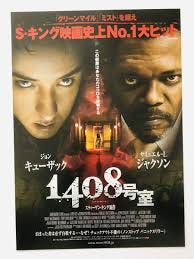
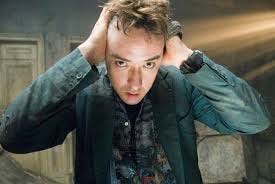
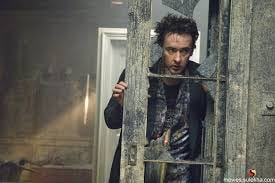
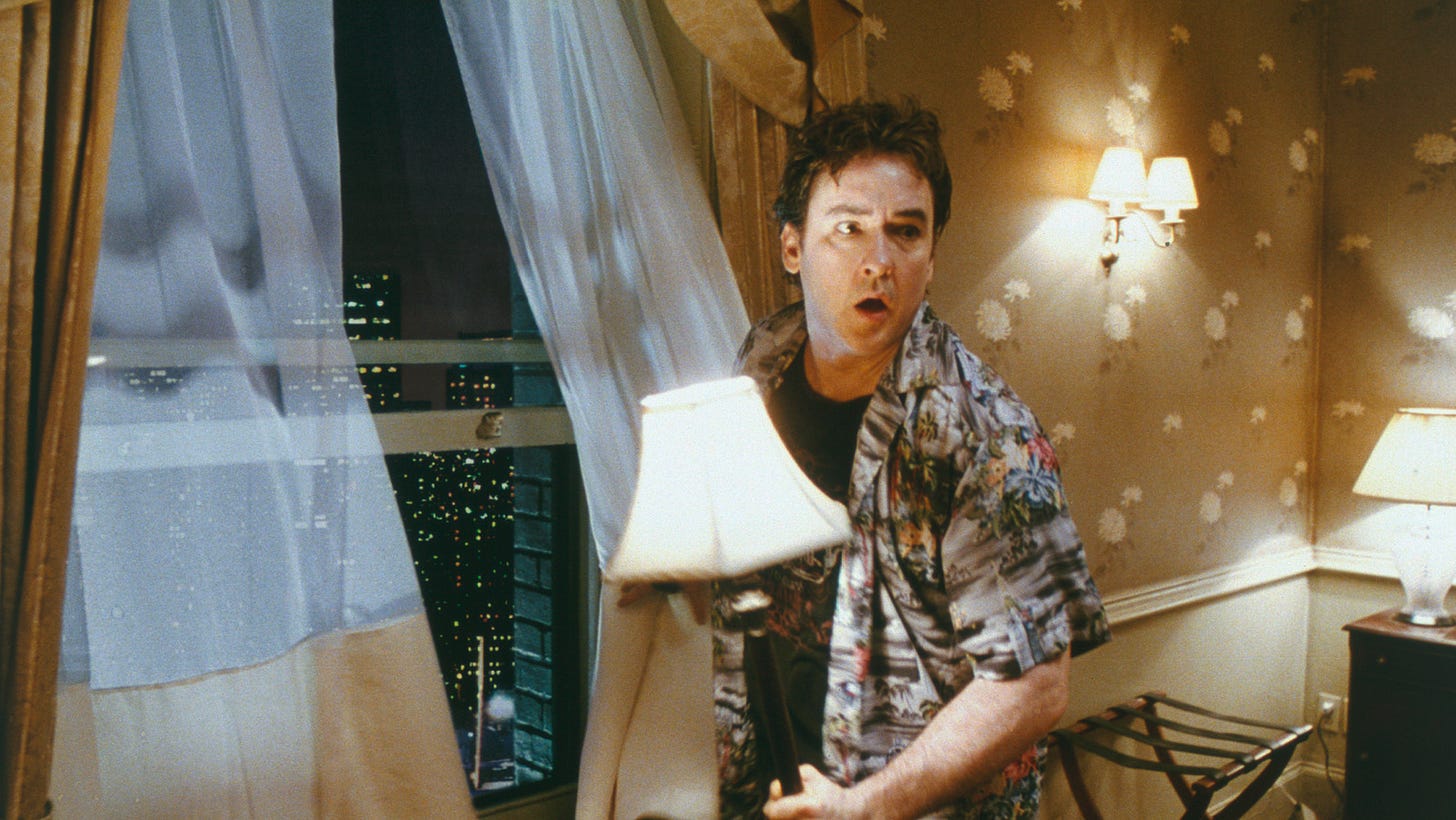
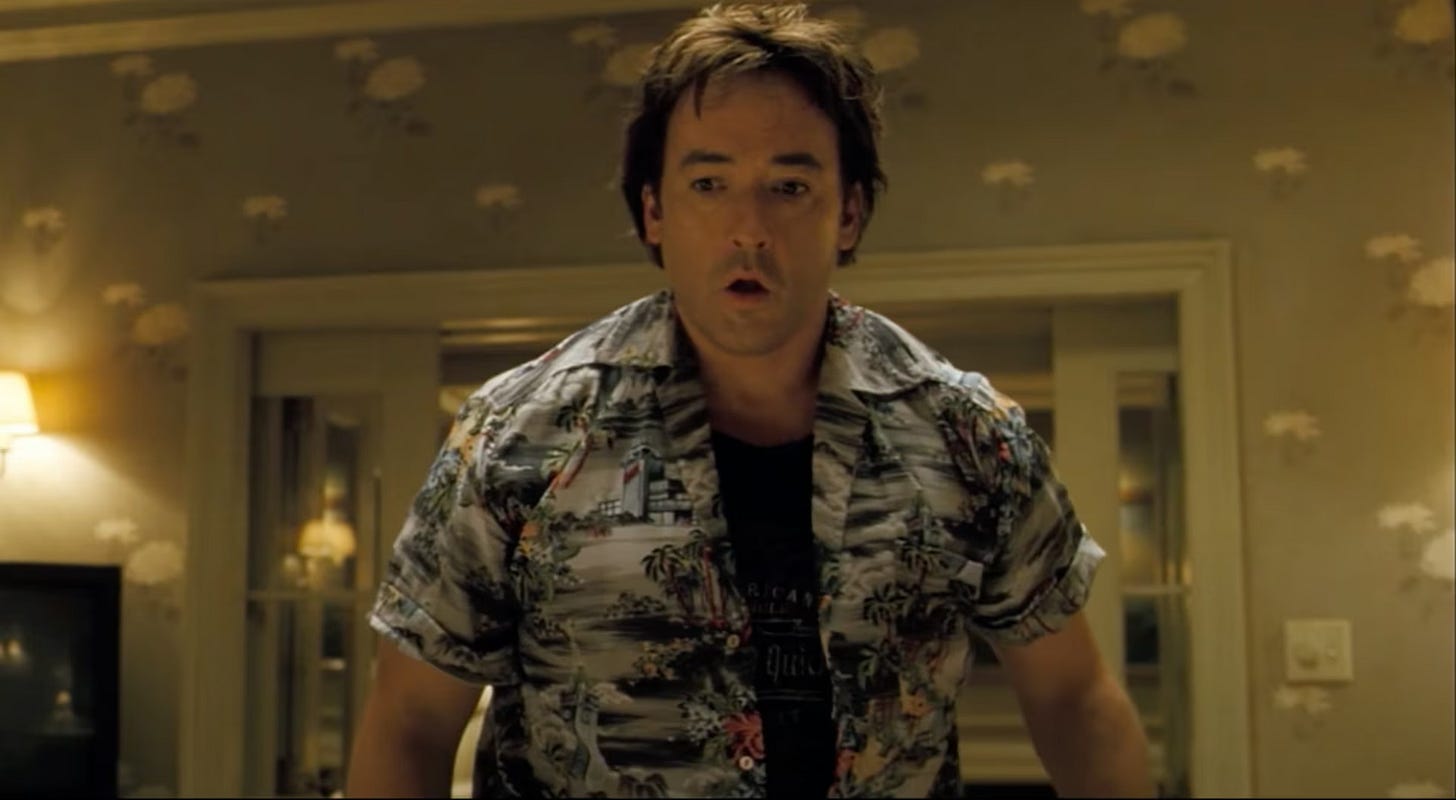


I'm too lazy to fact-check this, but in my mind "1408" was the last major-studio, theatrical release for John Cusack. Everything since has been indie pulp or straight to video/streaming fare.
I guess it happens to the best of them...I am now seeing the same thing from actors like Thomas Jane and Aaron Eckhart. (I think Bruce Willis was a special case because so much of his late-career dreck may have been attributable to an unethical manager taking advantage of Willis' mental state.)
EGAD! Mr King has done it AGAIN! 🐦⬛🧐